TEENAGERS over the age of 16 and adults with mental illnesses are being denied free medication because the State has refused to correct defective legislation, confidential documents reveal.
Leaked documents obtained by the Irish Mail on Sunday show the Government has known that legislation – under which only those under 16 with a mental illness are entitled to free medication – is discriminatory and legally unsound for more than a decade.
The revelation will heap further pressure on the Coalition, which has come under fire in recent weeks after this newspaper uncovered details of a secret legal strategy to block nursing home fee refunds for people who paid for private beds when no public beds were available.
Documents provided to the MoS in a protected disclosure from Department of Health whistleblower Shane Corr reveal the office of the former Attorney General (now Court of Appeal judge) Máire Whelan, warned the Government as far back as 2012 that sections of the legislation governing the entitlement of free medication were ‘ultra vires’, meaning they were ‘beyond the powers’ granted to the Government by law.
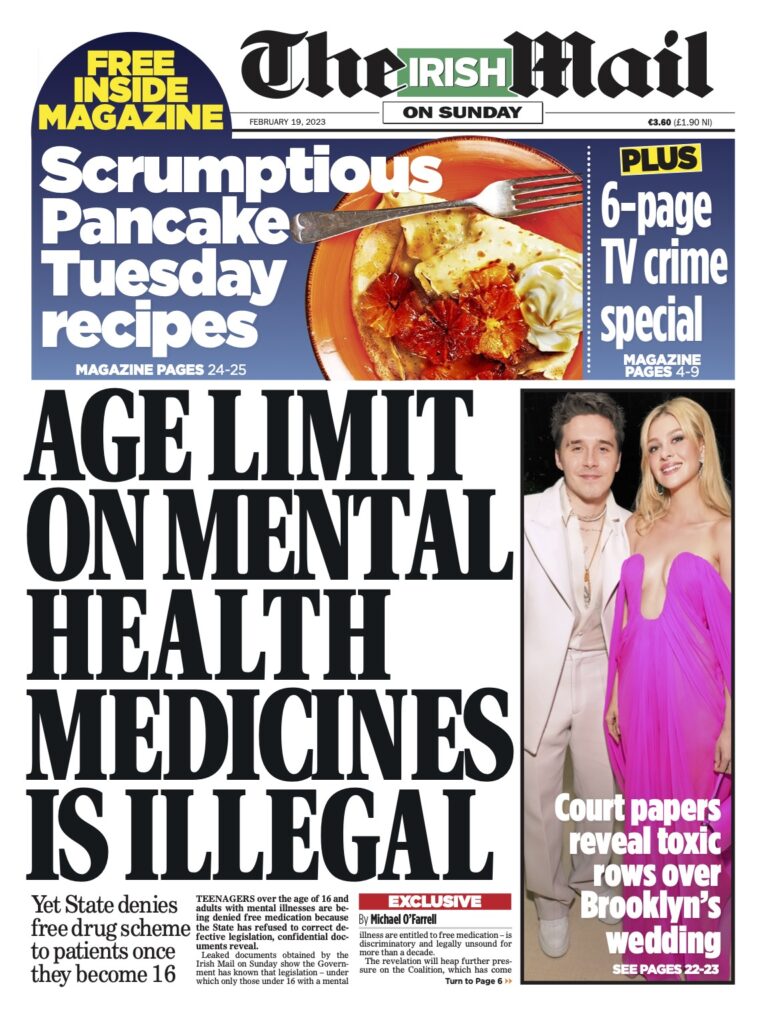
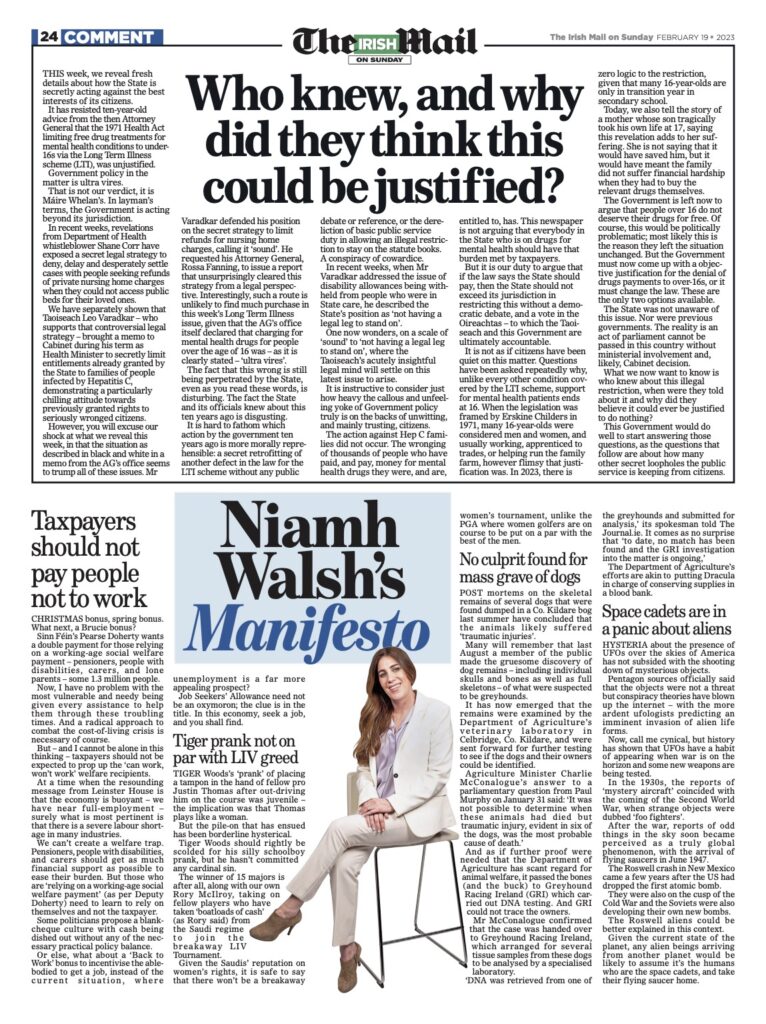
The flawed legislation remains in place today, meaning thousands of citizens have been – and are being – denied free access to drugs and medication to which they are legally entitled.
Other parts of the defective legislation were secretly corrected when it came to light in 2012 by quietly, and without debate, tacking on an amendment to an unrelated health bill.
When pressed on the matter, a spokesman for Taoiseach Leo Varadkar last night claimed the Government was concerned that changing the flawed legislation preventing those over 16 being provided with free medication ‘could jeopardise the entire existence [of the scheme] if found ultra vires [invalid].’
The spokesman said: ‘Patients with LTI (Long-Term Illness) cards could then lose access to free medication if it were found their entitlement was not and had not been legally sound.’
However, Mr Corr last night accused the State of keeping ‘this issue under the carpet for a decade, denying entitlement to untold thousands’.
Mr Corr added: ‘It now needs to deal with this ongoing issue by correcting failures and compensating those who lost out.’
The latest disclosures involve Government decisions that were made as the Department of Health was aggressively implementing its secret strategy to limit payouts to families that were illegally overcharged nursing home fees.
In April 2012, the attorney general provided a detailed briefing to the secretary general of the Department of Health in which she outlined serious concerns about the legal basis for the legislation governing free medication.
This was just a month after former Taoiseach Enda Kenny and a handful of his senior Cabinet ministers were given an update on the State’s controversial legal approach to the nursing home payouts.
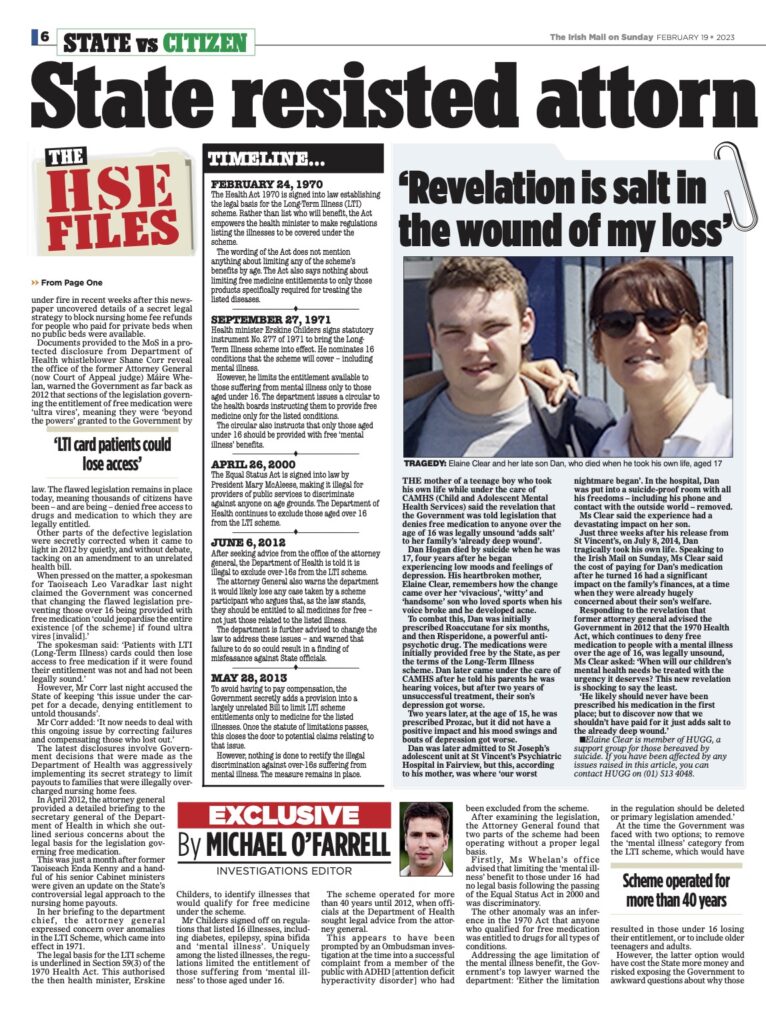
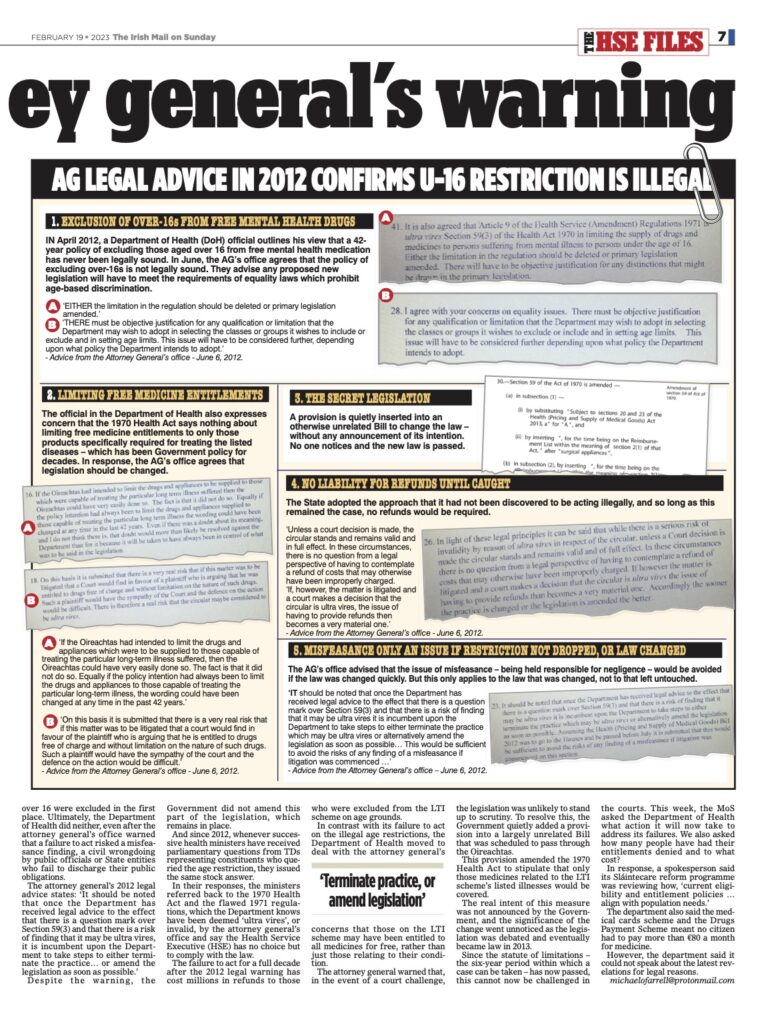
In her briefing to the department chief, the attorney general expressed concern over anomalies in the LTI Scheme, which came into effect in 1971.
The legal basis for the LTI scheme is underlined in Section 59(3) of the 1970 Health Act. This authorised the then health minister, Erskine Childers, to identify illnesses that would qualify for free medicine under the scheme.
Mr Childers signed off on regulations that listed 16 illnesses, including diabetes, epilepsy, spina bifida and ‘mental illness’. Uniquely among the listed illnesses, the regulations limited the entitlement of those suffering from ‘mental illness’ to those aged under 16.
The scheme operated for more than 40 years until 2012, when officials at the Department of Health sought legal advice from the attorney general.
This appears to have been prompted by an Ombudsman investigation at the time into a successful complaint from a member of the public with ADHD [attention deficit hyperactivity disorder] who had been excluded from the scheme.
After examining the legislation, the Attorney General found that two parts of the scheme had been operating without a proper legal basis.
Firstly, Ms Whelan’s office advised that limiting the ‘mental illness’ benefit to those under 16 had no legal basis following the passing of the Equal Status Act in 2000 and was discriminatory.
The other anomaly was an inference in the 1970 Act that anyone who qualified for free medication was entitled to drugs for all types of conditions.
Addressing the age limitation of the mental illness benefit, the Government’s top lawyer warned the department: ‘Either the limitation in the regulation should be deleted or primary legislation amended.’
At the time the Government was faced with two options; to remove the ‘mental illness’ category from the LTI scheme, which would have resulted in those under 16 losing their entitlement, or to include older teenagers and adults.
However, the latter option would have cost the State more money and risked exposing the Government to awkward questions about why those over 16 were excluded in the first place.
Ultimately, the Department of Health did neither, even after the attorney general’s office warned that a failure to act risked a misfeasance finding, a civil wrongdoing by public officials or State entities who fail to discharge their public obligations.
The attorney general’s 2012 legal advice states: ‘It should be noted that once the Department has received legal advice to the effect that there is a question mark over Section 59(3) and that there is a risk of finding that it may be ultra vires, it is incumbent upon the Department to take steps to either terminate the practice- or amend the legislation as soon as possible.’
Despite the warning, the Government did not amend this part of the legislation, which remains in place.
And since 2012, whenever successive health ministers have received parliamentary questions from TDs representing constituents who queried the age restriction, they issued the same stock answer.
In their responses, the ministers referred back to the 1970 Health Act and the flawed 1971 regulations, which the Department knows have been deemed ‘ultra vires’, or invalid, by the attorney general’s office and say the Health Service Executive (HSE) has no choice but to comply with the law.
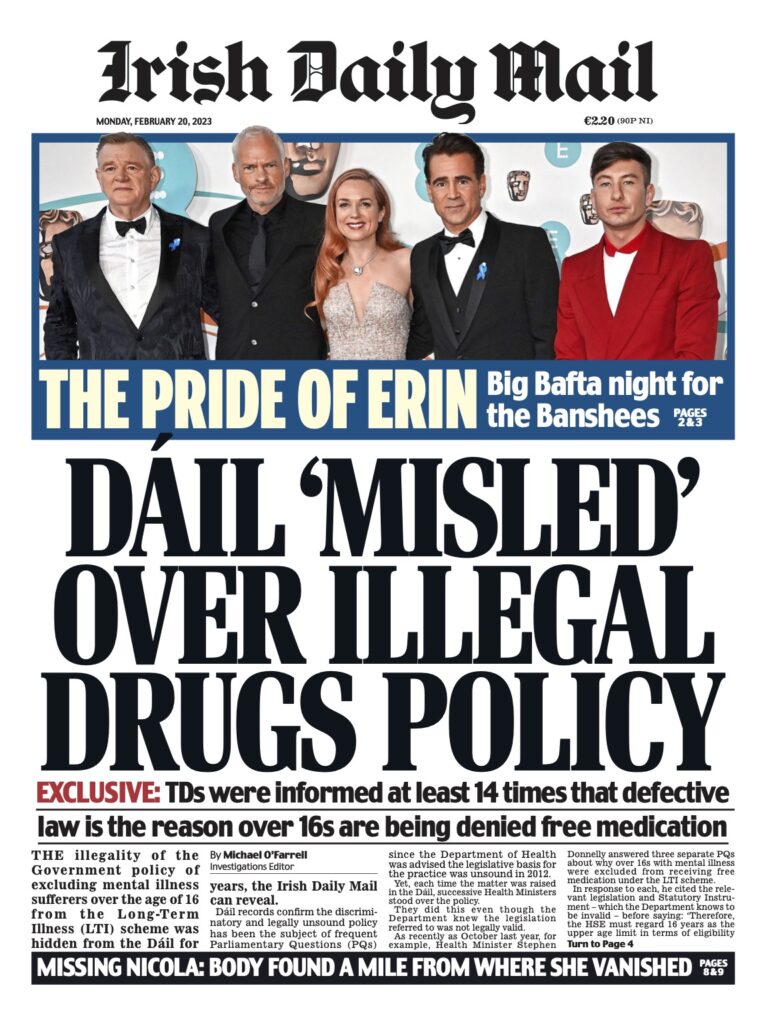
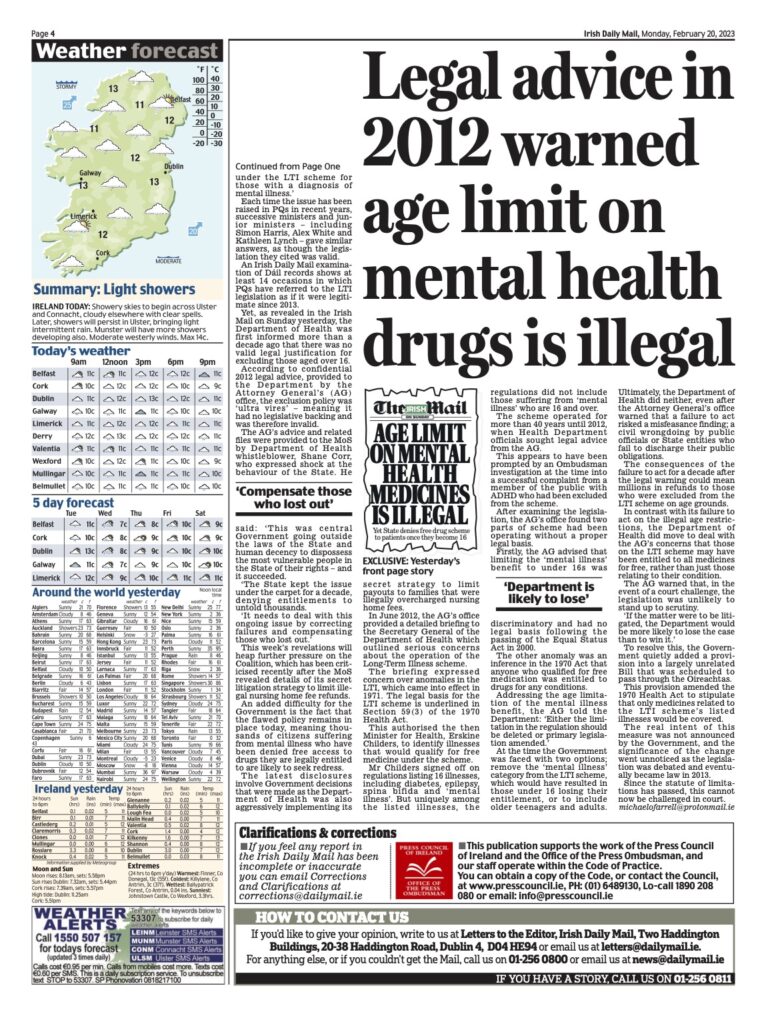
The failure to act for a full decade after the 2012 legal warning has cost millions in refunds to those who were excluded from the LTI scheme on age grounds.
In contrast with its failure to act on the illegal age restrictions, the Department of Health moved to deal with the attorney general’s concerns that those on the LTI scheme may have been entitled to all medicines for free, rather than just those relating to their condition.
The attorney general warned that, in the event of a court challenge, the legislation was unlikely to stand up to scrutiny. To resolve this, the Government quietly added a provision into a largely unrelated Bill that was scheduled to pass through the Oireachtas.
This provision amended the 1970 Health Act to stipulate that only those medicines related to the LTI scheme’s listed illnesses would be covered.
The real intent of this measure was not announced by the Government, and the significance of the change went unnoticed as the legislation was debated and eventually became law in 2013.
Since the statute of limitations – the six-year period within which a case can be taken – has now passed, this cannot now be challenged in the courts. This week, the MoS asked the Department of Health what action it will now take to address its failures. We also asked how many people have had their entitlements denied and to what cost?
In response, a spokesperson said its Sláintecare reform programme was reviewing how, ‘current eligibility and entitlement policies – align with population needs.’
The department also said the medical cards scheme and the Drugs Payment Scheme meant no citizen had to pay more than €80 a month for medicine.
However, the department said it could not speak about the latest revelations for legal reasons.


